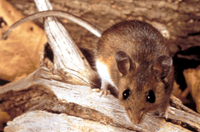 Hantavirus pulmonary syndrome (HPS) is a deadly disease transmitted by infected rodents through urine, droppings, or saliva. Humans can contract the disease when they breathe in the virus that is on dust and other debris floating in the air. HPS was first recognized in the southwest United States in 1993 and has since been identified throughout the United States. One case has been identified in Virginia. In 1993, a hiker on the Appalachian trail developed HPS. He was hospitalized and recovered. His exact location of exposure could never be established (Vol. 43 / No. 47, MMWR 877,”Emerging Infectious Diseases Hantavirus Pulmonary Syndrome — Virginia, 1993″). Although rare, HPS is potentially deadly. Rodent control in and around the home remains the primary strategy for preventing hantavirus infection.
Hantavirus pulmonary syndrome (HPS) is a deadly disease transmitted by infected rodents through urine, droppings, or saliva. Humans can contract the disease when they breathe in the virus that is on dust and other debris floating in the air. HPS was first recognized in the southwest United States in 1993 and has since been identified throughout the United States. One case has been identified in Virginia. In 1993, a hiker on the Appalachian trail developed HPS. He was hospitalized and recovered. His exact location of exposure could never be established (Vol. 43 / No. 47, MMWR 877,”Emerging Infectious Diseases Hantavirus Pulmonary Syndrome — Virginia, 1993″). Although rare, HPS is potentially deadly. Rodent control in and around the home remains the primary strategy for preventing hantavirus infection.
